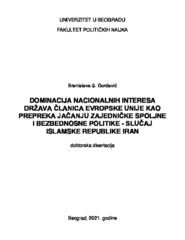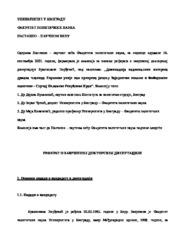Prikaz osnovnih podataka o disertaciji
Dominacija nacionalnih interesa država članica Evropske unije kao prepreka jačanju zajedničke spoljne i bezbednosne politike - slučaj Islamske Republike Iran
| dc.contributor.advisor | Kovačević, Maja | |
| dc.contributor.other | Čupić, Zoran | |
| dc.contributor.other | Vukasović, Dejana M. | |
| dc.creator | Đorđević, Branislava S. | |
| dc.date.accessioned | 2022-05-31T09:25:45Z | |
| dc.date.available | 2022-05-31T09:25:45Z | |
| dc.date.issued | 2021-12-29 | |
| dc.identifier.uri | https://eteze.bg.ac.rs/application/showtheses?thesesId=8608 | |
| dc.identifier.uri | https://fedorabg.bg.ac.rs/fedora/get/o:25771/bdef:Content/download | |
| dc.identifier.uri | https://plus.cobiss.net/cobiss/sr/sr/bib/60822281 | |
| dc.identifier.uri | https://nardus.mpn.gov.rs/handle/123456789/19104 | |
| dc.description.abstract | Disertacija se bavi analizom spoljnopolitičkog delovanja Evropske unije prema Islamskoj Republici Iran, kako bi odgovorila na pitanje na koji način dominacija aktivnosti ključnih država članica (u prvom redu Velike Britanije1, Francuske i Nemačke) i njihovih nacionalnih političkih, bezbednosnih i ekonomskih interesa u odnosu sa Teheranom, utiču na razvoj Zajedničke spoljne i bezbednosne politike. Odsustvo jasno razvijenog strateškog razumevanja sopstvenih ciljeva, prioriteta i efektivne uloge Zajedničke spoljne i bezbednosne politike Evropske unije prikazano je kroz bilateralne odnose pomenutih ključnih država članica sa Islamskom Republikom Iran, čiji se značaj za evropske zemlje ogleda u njegovom geografskom položaju, regionalnoj ulozi, veličini i broju stanovnika, bogatstvu naftom i gasom. Analizirajući odnose Evropske unije sa Iranom, a posebno ključne momente u bilateralnim odnosima Velike Britanije, Francuske i Nemačke sa iranskom državom – koji determinišu domete njihove sadržajne saradnje – autor zaključuje da se proklamovane vrednosti i normativni ciljevi Unije prelamaju kroz prizmu nacionalnih interesa navedenih vodećih članica, time ograničavajući jedinstven strateški pristup Zajedničke spoljne i bezbednosne politike u odnosu na Iran. Unija se u svojoj politici prema Teheranu kretala po sinusoidnoj liniji, koristeći jačanje političkih i ekonomskih veza, ali i uvodeći oštre sankcije, kaznene mere i pretnje. Politika uslovljavanja, koja je formalno bila zasnovana na dvostrukom koloseku (“štapa i šargarepe”) zapravo je u glavnim odrednicama pratila politiku transatlantskog saveznika, svodeći se u svojoj suštini na politiku zastrašivanja, obuzdavanja i konfrontacije teokratskom režimu u Teheranu. Kroz opis i objašnjenje uloge ključnih država članica Evropske unije u regionu Bliskog istoka pre formiranja Islamske Republike Iran, preko Islamske revolucije, Iransko-iračkog rata, evropske politike konstruktivnog i uslovljavanog angažovanja Teherana, sve do politike dvostrukih standarda u pregovorima oko iranskog nuklearnog programa i zaključivanja nuklearnog sporazuma sa Iranom, odnosno Zajedničkog sveobuhvatnog plana akcije 2015. godine, argumetuje se da dominacija nacionalnih interesa ključnih država članica iz grupe E3 (poput očuvanja slobodnog protoka nafte i gasa i obezbeđenja kontinuiranog snabdevanja energetskim resursima, očuvanje izvoznog tržišta u regionu i konsolidacije političkog uticaja, koji je zasnovan na percepciji o njihovoj ulozi jednog od najvažnijih činilaca i aktera međunarodne politike), značajno limitira i sprečava razvoj koherentne i efektivne Zajedničke spoljne i bezbednosne politike prema Islamskoj Republici Iran, ali i onemogućava da Teheran bude koristan saveznik politici Evropske unije u geostrateški i geopolitički važnom regionu Bliskog istoka. Na taj način autor ukazuje na probleme, inherentne evropskim pokušajima implementacije multifunkcionalne Zajedničke spoljne i bezbednosne politike, kao i na postojeće izazove uspešnom sprovođenju evropske strategije u okvirima multilateralizma. Posebno se objašnjava redukcionistička politika Evropske unije i njenih vodećih članica (E3), koja je koncentrisana na postizanje nuklearnog sporazuma sa Iranom i koja ne obuhvata i ne uvažava potpunu geopolitičku sliku odnosa u regionu Bliskog istoka, a posebno uzroke iranske spoljne politike i pokušaja širenja uticaja u regionu. Imajući u vidu odsustvo strateškog pristupa u politici Evropske unije prema Islamskoj Republici, transatlantsko partnerstvo i nacionalne interese, ciljeve i kapacitete Velike 1 Iako je Velika Britanija istupila iz Evropske unije, od izuzetnog značaja je analiza njene uloge kao primera delovanja države članice Unije. Britanije, Francuske i Nemačke (E3), njihove odnose sa Vašingtonom sa jedne i Teheranom, sa druge strane, ali i determinante koje određuju iransko spoljnopolitičko odlučivanje, ukazuje se da postoje ograničene mogućnosti za efektivno očuvanje nuklearnog sporazuma. | sr |
| dc.description.abstract | The thesis deals with the analysis of foreign policy actions of the European Union towards the Islamic Republic of Iran, in order to answer the question how the domination of key member states’ activities (primarily Great Britain2, France and Germany) and their national political, security and economic interests in their relations with Teheran, influence the development of Common Foreign and Security Policy. The lack of clearly elaborated strategic comprehension of very goals of Common Foreign and Security Policy, and its priorities and effective role, can be observed in bilateral relations of the mentioned key members states with the Islamic Republic of Iran, whose significance, from the European countries’ point of view, is reflected in its geographic position, regional role, its size and number of its citizens, as well as its oil and gas resources. By analysing the relations between the European Union and Iran, with particular reference to key moments in bilateral relations of Great Britain, France and Germany with the Iranian state – which determine the scope of their comprehensive cooperation – the author concludes that the proclaimed values and normative goals of the Union, refract through the prism on national interests of the said leading members, thus limiting a unique strategic approach of Common Foreign and Security Policy in relation to Iran. In its policy towards Iran, the Union has followed a sinusoid line, making use of the strengthening of political and economic ties, but imposing strict sanctions, penalties and threats as well. The policy of conditioning, which was formally founded on double standards (“the stick and carrot” model), in fact, by its main determinants, followed the policy of the transatlantic ally, being reduced in its essence to the policy of intimidation, restraining and confrontation with the theocratic regime in Teheran. Through the description and explanation of the role that key European Union member states played in the Middle East region prior to the establishment of the Islamic Republic of Iran, through the Islamic revolution, Iran-Iraq war, European policy of constructive and conditioned engagement of Teheran, and finally to the policy of double standards in the process of negotiating the Iranian nuclear programme and concluding the nuclear agreement with Iran, or Joint Comprehensive Plan of Action of 2015, it is argued that the domination of national interests of the key member states of E3 group (such as preservation of free oil and gas flow and provision of continued supply of energy resources, maintenance of export market in the region and consolidation of political influence founded on the perception of their role as one of the most important elements and actors of international politics), considerably limits and prevents the development of a coherent and effective Common Foreign and Security Policy towards the Islamic Republic of Iran, but it also prevents Teheran from being a useful ally to the European Union policy in a geostrategically and geopolitically significant region of the Middle East. Thus, the author points to the problems, inherent in the European efforts to implement multifunctional Common Foreign and Security Policy, and to existing challenges to the successful implementation of European strategy in the framework of multilateralism. The reductionist policy of the European Union and its leading members (E3) is explained in particular, being focused on achieving the nuclear agreement with Iran, without including and taking into consideration the full geopolitical state of the relations in the Middle East region, and especially 2 Though Great Britain withdrew from the European Union, it is of exceptional importance to analyse its role as an example of a Union member state effect. the causes for Iranian foreign policy and attempts at spreading influence in the region. The lack of the strategic approach of the European Union policy in relation to the Islamic Republic of Iran, the transatlantic partnership and national interests, goals and capacities of Great Britain, France and Germany (E3), their relations with Washington on one hand, and with Teheran on the other, and the determinants which define the Iranian foreign policy decision making, they all indicate that there exist limited possibilities for effective preservation of the nuclear agreement. | en |
| dc.format | application/pdf | |
| dc.language | sr | |
| dc.publisher | Универзитет у Београду, Факултет политичких наука | sr |
| dc.rights | openAccess | en |
| dc.rights.uri | https://creativecommons.org/licenses/by-nc-nd/4.0/ | |
| dc.source | Универзитет у Београду | sr |
| dc.subject | Evropska unija | sr |
| dc.subject | European Union | en |
| dc.subject | Iran | en |
| dc.subject | Common Foreign and Security Policy | en |
| dc.subject | Common Security and Defence Policy | en |
| dc.subject | national interests | en |
| dc.subject | nuclear programme | en |
| dc.subject | bilateral relations | en |
| dc.subject | security actor | en |
| dc.subject | Middle East | en |
| dc.subject | Iran | sr |
| dc.subject | Zajednička spoljna i bezbednosna politika | sr |
| dc.subject | Zajednička bezbednosna i odbrambena politika | sr |
| dc.subject | nacionalni interesi | sr |
| dc.subject | nuklearni program | sr |
| dc.subject | bilateralni odnosi | sr |
| dc.subject | bezbednosni akter | sr |
| dc.subject | Bliski istok | sr |
| dc.title | Dominacija nacionalnih interesa država članica Evropske unije kao prepreka jačanju zajedničke spoljne i bezbednosne politike - slučaj Islamske Republike Iran | sr |
| dc.type | doctoralThesis | |
| dc.rights.license | BY-NC-ND | |
| dcterms.abstract | Ковачевић, Маја; Чупић, Зоран; Вукасовић, Дејана М.; Ђорђевић, Бранислава С.; Доминација националних интереса држава чланица Европске уније као препрека јачању заједничке спољне и безбедносне политике - случај Исламске Републике Иран; Доминација националних интереса држава чланица Европске уније као препрека јачању заједничке спољне и безбедносне политике - случај Исламске Републике Иран; | |
| dc.identifier.fulltext | http://nardus.mpn.gov.rs/bitstream/id/143354/Izvestaj_Komisije_12299.pdf | |
| dc.identifier.fulltext | http://nardus.mpn.gov.rs/bitstream/id/143353/Disertacija_12299.pdf | |
| dc.identifier.rcub | https://hdl.handle.net/21.15107/rcub_nardus_19104 |



